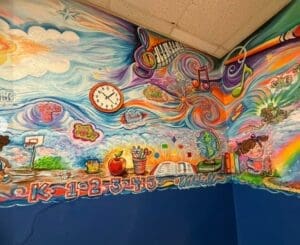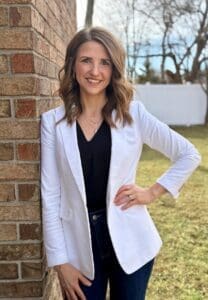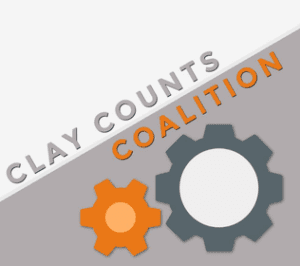When helping a client give birth, doula Jackie Ware said whatever the mama wants, the mama gets. From medicine, to lack thereof, to a home experience vs. a hospital setting, to who’s in the room, to the ambiance of the setting, it’s her goal to provide the experience that the new mother wants.
“My role is to serve the family, however that may take place,” she said. While doctors and nurses or midwives will handle the medical side of things, Ware said that frees her up to focus on additional needs. “I’m helping Mom find ways to move her body or guide her breathing, remind her about that epidural if she was considering it,” she said. “Or maybe I’m supporting other members of the family and making sure their needs are being taken care of.”
She said that can range from partners or siblings who may be present and need reassurance that Mom is ok through the birthing process.
“I want them to feel safe because it’s intense so I just remind them that Mommy’s ok.”
Since 2022 she has worked as a doula for patients in the surrounding area, often in Manhattan, Topeka, Wamego, or home births.
It’s a career path she had been eyeing since childhood.
“I’ve always been interested in birth,” she said. “When I was a kid I would watch A Baby Story on TLC. Which looking back now, it’s a terrible show, but I loved watching about the birth process.”

Then after graduating from CCCHS, Ware went to K-State, studying anthropology. While earning her degree, she participated in several medical-guided studies on birth rates around the world, and specialized in birth culture.
“I learned that the maternal mortality rate in the U.S. is appallingly high,” she said. “In first-world countries, we have the worst rate, something like two deaths per 10,000.”
Put out by the World Health Organization in 2020, the United States is 65th on the list of maternal mortality rates with 22.3 deaths per 100,000 births, which is more than double the rate from 1985. It’s a number that ties the U.S. with Malaysia, and is a higher mortality rate than Saudi Arabia, Egypt, Kuwait, Chile, Hungary, and Russia. Meanwhile, the average in Europe is 13.2 deaths per 100,000. The united Kingdom itself is just 9.8, Canada is 11, Australia is 2.9, and Belarus, a small land-locked country in Eastern Europe is the lowest at just 1.1.
“I looked at the data thinking, ‘If we’re in the 20s that’s really high from what it should be,’” she said. Armed with this knowledge and then her bachelor’s degree, and Ware decided to get into the business of birth.
Originally Ware said it was her plan to become a midwife, which requires a master’s degree in nursing. However, once she began having kids of her own, working as a doula fit better with her family dynamic.
Ultimately, she said she was drawn to the idea of educating pregnant moms, especially those who are having their first baby.
“We don’t have people in our system of birth who follows a person through,” she said. “The system works well for medical professionals and healthcare because there are shift changes and prenatal vs. postpartum and one person can’t do it all.”
However, Ware decided she could help fill that void. By educating newly pregnant moms and their partners, she could help walk them through their pregnancy and birthing journey. And, she’s provided follow-up communication after they’d given birth.
“When I got in, I know the doctor or midwife has the medical side covered,” she said. “I have knowledge of it, but that’s not my focus. I’m there to support Mom in her emotional state, whether that’s informational or just helping them feel equipped to ask the right questions.”
She added that part of her job is working as a cultural liaison by explaining medical jargon, which allows the patient to better understand their doctor’s feedback. Meanwhile, she has the patient’s wishes in mind and will guide them during the process.
“In labor there’s a lot going on and it can be hard to navigate,” she said. “There can be a power dynamic where it’s hard to speak up for yourself but if you have someone to help you, you can feel safer in that space.”
Ware will help patients through natural births as well as C-sections. Depending on the doctor or the hospital, she may be in the room for the surgery, or waiting to comfort Mom when her partner follows the baby.

“I always want the Dad to go in but if he’s feeling uneasy I will take his place,” she said. Otherwise, she often waits with the baby and takes “an absurd amount of pictures” on the client’s phone.
“Then I help Mom through the rest of the surgery because she’s without her support system. Just make sure she’s feeling well mentally and if she’s feeling up to it physically we will flip through the pictures.”
In total, Ware said she’d helped with significantly more hospital births than at home. With her own two children, Ware first started at a birthing center, before risking out of their care and delivering at a hospital. Because it was during COVID, she was only allowed one support person and dubbed her husband, Grady, her man-doula, or moula, for the experience. However, her second son was born at home while her husband received him after he was born.
“My home birth was so much better, just more peaceful,” she said. “But that isn’t the case for everybody.”
Because her work schedule is dependent on birth times, Ware said she works “by the grace of Grandmas,” once at a birth for an entire 24 hours. Another, a first-time Mom gave birth in the ER hallway after she had just arrived.
“I barely skidded in. She didn’t even make it to a room,” she said.
In total, Ware takes on about one client per month to balance her home and work life, and to ensure she’s available for Moms to visit – calling this the “Goldilocks zone.” From initial talks and a prenatal class, to helping with breastfeeding or bathing afterward, she said she’s an open book for patients and whatever they may need. She also offers sliding scales for payment, stating that she doesn’t want anyone to miss out on care due to finances.
“Birth is really an important time in your life that you’re really vulnerable, it can be very traumatic but I try to reduce that as much as I can. I want everyone to feel respected and well cared fr, even when things don’t go as they were planned.”













